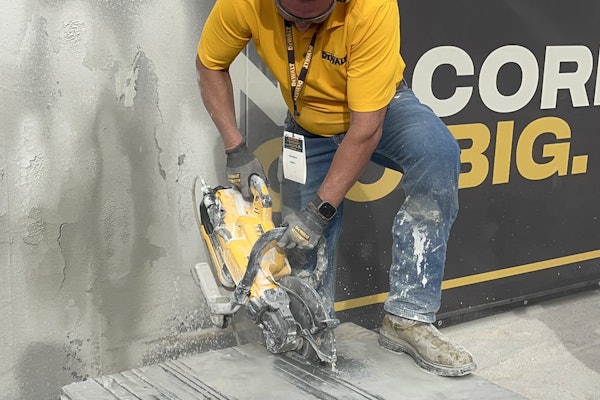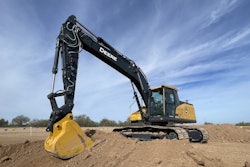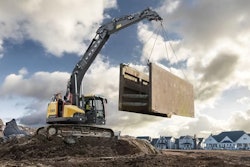To Larry Lafollette, Lafollette Excavating, life doesn’t get much better than this. He’s doing the type of work he enjoys best – utility and site development jobs requiring lots of face time with his clients – and he’s getting to do it with his two sons, Brad, 29, and Eric, 25. “That’s my version of success, when your kids want to do the same thing you do,” he says.
Lafollette quickly adds that his sons aren’t the only employees of note: “We’ve got a bunch of good guys. They’re loyal, they have great character and they value home life. And now we’ve got their kids wanting to come and work for us. It makes my job so much easier.” Depending on the time of the year, the company has between 12 and 15 employees.
Local kid
Construction runs deep in the Lafollette family. Larry’s father, Amos, operated his own utility construction firm and co-signed a note in 1975 for the then-19-year-old Lafollette to buy a backhoe and a dump truck. Even though this gave him a leg up, he still had to sell his car and motorcycle to make the deal. “The only thing I had to drive that first year was the dump truck,” he says with a laugh.
Lafollette has benefited from being a local kid who nurtured his company by working for other local kids. “When I started out, I worked with area plumbers and carpenters, the same people who are now the big developers in town,” he says. “We grew up together.” And it hasn’t hurt that Strafford is just a few miles away from Springfield, Missouri, which has seen its own growth spurt – according to the city’s Chamber of Commerce, Springfield’s metropolitan workforce has grown 27 percent in the past 10 years.
And since they learned the hard knocks together, a mutual admiration has developed between Lafollette and his clients. “Larry’s as honest as can be,” says client Brian Becker, of Brian Becker Construction, Springfield. “All the contractors in the area have great things to say about him.”
Riding the waves
Lafollette likes to keep his $2.5 million company diversified enough to ride any economic waves. And so his three crews can be found on jobs as small as a septic tank installation and as large as commercial site prep work. He’s also had his hand in land improvement work over the years, although that market has essentially dried up in his area.
He still, however, maintains his membership to the Land Improvement Contractors of America, plus the local homebuilders and Springfield contractors associations. He credits them with being “great avenues of education,” especially during the early days of his company.
Believing that “anyone can make money, it’s knowing what to do with it that’s the hard part,” Lafollette keeps a hands-on approach to the company till. All bills and timecards still go through him before processing. “Everyone makes mistakes,” he says, “especially in a business like this where we’re charging by the hour, and I like to catch problems before they go out. Then you’re not working on problems all the time and you can deal with the future.”
The vast majority of Lafollette Excavating’s work is negotiated, so maintaining good relationships becomes critical “because there’s so much trust involved,” Lafollette says. “You want to get into relationships where you don’t have to just talk about money. You talk about the job and the money is secondary.”
This figures into his decision to stay primarily within the Springfield metropolitan area, ignoring the lure of nearby boomtown Branson, Missouri. “The only way we’d go down there is if one of our customers asked us to, and they might have to ask us twice,” Lafollette says with a grin. “It’s strictly about the money down there and I’m not comfortable with that. Besides, there’s more than enough to do right here.”
“Here, everyone’s an operator” – Lafollette with his father Amos (right).
A young fleet
The company keeps its equipment relatively new and buys at least one new machine a year. Its 20-machine fleet includes track loaders, backhoes, graders and dump trucks. “We’re taking full advantage of the present depreciation bonus this year,” Lafollette comments. And if the company orders a new machine, it usually comes with all the operator bells and whistles. “We want our employees to be comfortable. Plus, if you get better equipment, they want to take care of it. It’s nothing for me to come back here in the evenings and find one of the guys washing a machine after his shift.”
He usually restricts the company’s straight rentals to breaker-equipped excavators, compactors and snow-removal equipment. Availability, however, may eventually prompt a purchase decision. “Excavators with breakers can sometimes be hard to find,” Lafollette says. “We might have to end up owning an outfit.”
Even though he pays close attention to the books, Lafollette still gets in his stick time. “I’m usually on a machine every other week,” he says, “filling in wherever I’m needed. Here, everyone’s an operator.”
Pointed skyward
Lafollette tells about going to his banker to ask for a loan after 20 years of being in business. “I told him, ‘I think I’m going to do this for a living now,'” he recalls.
Lafollette worked for 15 of those years without a vacation, struggling to get his company on a firm foundation. “For a long time,” he says, “I was always second doubting myself, and asking if I was doing things right.”
For the past six years, however, he’s literally taken to the sky when the work eases on the ground, taking off in a Cherokee Archer he jointly owns with three others.
“I bought a plane before I knew how to fly,” he says, “but I’ve kind of done everything that way. I didn’t know how to run a backhoe until I bought it, either. With payments, you learn a little quicker.”
When he was younger, Lafollette had dreams of doing big highway jobs “with all that equipment lined up,” as he puts it. When he dipped his toe into low-bid highway work, however, he found out it made him miserable. And so he’s comfortable where he’s at, growing along with the local market and diversifying when the signals are there.
Wherever he takes his company next, Lafollette says he doesn’t want to lose the personal touch. “With everyone on a cell phone, it’s sometimes harder to keep our relationships face to face,” he says. “But one-on-one conversations and hand shakes still go a long way.”






